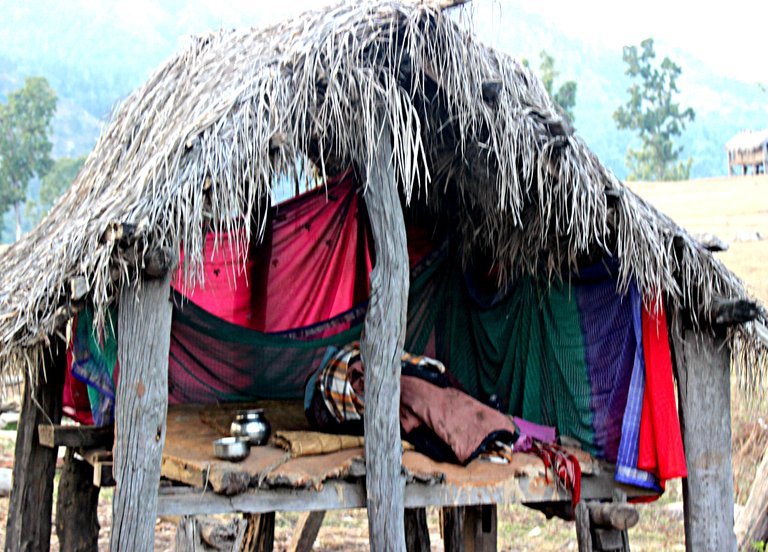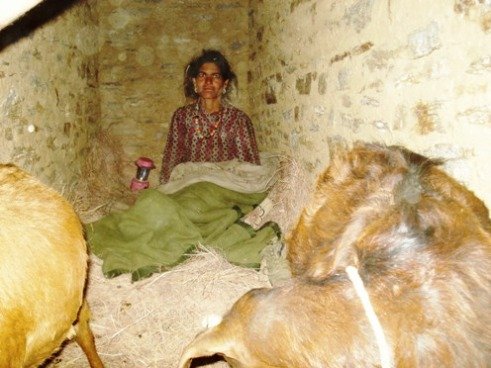Nepal is undoubtedly very rich in culture and traditions. The diversity existing in our country surely has amazed and attracted people from all over the world. However, there are such ridiculous traditions in our country which will make you cringe.
Chaupadi Pratha is a tradition practiced in several areas of Nepal by Hindu people. It specially prevails in the western parts of Nepal. Here in Nepal, people treat period as something very dirty, impure and contaminating. So, the women who are having their period are considered to be ‘impure’ and “untouchable”. The word Chaupadi is a combination of two words: “Chau”, which means the condition of untouchability and “Padi” which means being. Hence, Chaupadi means the condition of women being untouchable.

When a girl gets her first period, she is kept away from her home, friends and family. She is kept in a cattle shed or a small mud-hut. She is not allowed to see the face of any male members from her family for 10 to 15 days. And for next periods, she has to stay in the shed for 4 to 7 days depending on her menstrual cycle. Women are forbidden to touch men or enter into any rooms of their house and touch anything, specially food. Because people have a wrong belief that if menstruating women touch food during period, the food rots.
Similarly, they have other superstitious beliefs such as if a menstruating woman touches a tree, it will never again bear fruit; if she consumes milk, the cow will not give any more milk; if she reads a book, Saraswati the goddess of education will become angry; if she touches a man, he will be ill.


During period, one needs to consume healthy and nutritious food. But here in some places of Nepal, women are forbidden to eat any nutritious foods like milk, curd, eggs; they have to survive with rice, salt and water. They are completely forbidden to touch the cattle or crops because people believe that touching them on their period does some serious harm to them. Also, they aren't allowed to wash or comb their hair during the period.
The sheds they are kept in are usually very dirty and cold due to which a lot of women become sick and many of them die also. Below is the picture of a person whose daughter died while practising Chaupadi.

That’s what happens in rural areas of Nepal. The people there aren’t educated enough to understand how brutal the tradition is. And even if they are educated, they don’t speak up against it or make attempts to eradicate this tradition because people have a very deep-rooted belief and it’s extremely difficult to make people realize about the negative impacts of this tradition.

I still remember my friends missing school for 10-15 days and living away from family when they got their first periods. And I cannot forget how badly one friend's father had cried after 2/3 days of being away from his daughter. When I got to hear and see such things, I was terrified; I thought I would also have to go through the same thing when I got my first period. But thankfully, my parents didn’t make me do so. However, my mom had created certain restrictions inside our house. But those restrictions made no sense to me and they were completely baseless and illogical, so I argued with mom every month and tried to eradicate the humiliating tradition from my home. And now, my mom seems to be convinced and I feel very happy that I was able to make a certain change in my house.
The scenario in the city areas is somehow different and better than in the rural areas but still not good. Here, women are allowed to live with their family but have certain restrictions inside the house. They aren’t allowed to enter and touch anything in the kitchen. Similarly, they aren’t allowed to enter the “Pooja Kotha”, a room where people worship and pray. Still in many families, when everyone dines together in the dining table, a girl on her period should sit in the corner of her room and eat alone.
As every other culture and tradition, this one is also believed to have a root in the religion. It is believed that there used to be a king of the gods, who committed a great sin. To make up for his horrible doings, he created menstruation, forcing women to suffer for and with him on a monthly basis. The Hindu scriptures state that while menstruating, women are highly infectious and viruses are spread through their mouth and limbs, marking them as dangerous and impure.
As far as I know and I have heard, in the western countries, the first period of a girl is celebrated with joy but here, it is a matter of disgrace to people. While they should be making her feel good about the beautiful transition into womanhood, they keep her away from her family and torture her. How rational is it to torture humans in the name of tradition? The Supreme Court of Nepal had banned this tradition in 2004 but people are still following it blindly without realizing how disgusting it is.
click here!This post received a 4% upvote from @randowhale thanks to @elishagautam! For more information,
So glad you are giving them a voice with your story.
I'm trying to actually go to those places and do something significant. Thank you very much for reading and commenting. :)
Poor people, especially people living in rural areas, follow many strange beliefs because they never had the chance to come in contact with the modern knowledge of how the world really works. I'm sure most of the people who blindly follow this tradition don't know what menstruation is and what it serves in the female body. The only way to overcome this is the spread of education, as well as contact with different ways of thinking!
People in Nepal need free thinking people like you. Keep it up!
Yes. They don't. They don't also know that something like sanitary pad exists. They have no idea about menstrual hygiene. It's really sad that they have to go through all these. We have been trying our best to make situation better. :) Thanks!
By the way, your posts are very interesting. Just followed you. :)
I know right! I have grown up listening to stories about all these from my friends... I used to feel really bad that they had to go through all this.
Weird beliefs. Very weird.
Indeed! I really hope the coming generations won't have to go through all these.
Perhaps someone could circulate a document written by influencial Nepalese figures explaining why this tradition should no longer be practiced along with detailed instructions on good hygiene practices.
People have been going to such areas for creating awareness but it's quite difficult to remove it all at once. I am soon going to be involved in a project about it. I really hope our efforts will change this to some extent. :)
I didin't know this.. I'm so sad for this situation happened in your country :(
Yeah it's really sad. But we are making efforts through awareness programs and stuff. We hope to make a change. :)
Congratulations @elishagautam! You have completed some achievement on Steemit and have been rewarded with new badge(s) :
Click on any badge to view your own Board of Honnor on SteemitBoard.
For more information about SteemitBoard, click here
If you no longer want to receive notifications, reply to this comment with the word
STOPIf you want to support the SteemitBoard project, your upvote for this notification is welcome!
Thank you :)
That's a really interesting post, thank you for sharing!
Thank you for reading :)
That's just outrageous! Thank you posting this! Upvoted.
Thank you so much! :D
Interesting post. Thank you
click on.
Hi! Have you heard about @krwhale? It is similiar with @randowhale. For your information please
Actually our ancestors were very educated about mensuration periods but was later misinterpreted so much with every next generation to end up like this.
Same ancestors were the ones who practiced yoga and meditation.
This is such a shame. Shame on us that we don't try to teach them in a way they understand about periods, importance of keep them in clean space, giving them time for good rest during such pain. If other households aren't clean enough, they should stay away from that room. Also, during periods, women need more nutrients than normal days.
Problem is, these people have never read the book. Instead, follow those idiotic pundits who are self proclaimed educated ones (which they are not since most of the only recite and don't even understand the proper meaning of what they are reciting. Actually, they are the ones who misinterpreted the proper way of taking care of women during periods to such horrible one. )
Here's an extract hindufacts.org:
Angirasa Smriti (Verse 37), for example, advises women to resume their household work only after their monthly periods stop. Similarly, Vashishta Dharmasutra (5.6) says that menstruating women should not indulge in physical exertion, be it household work, or activities like running. During Ambubachi festival in Kamakhya temple in Assam, the temple is closed for three days to give rest to the Goddess, who is believed to be menstruating during that time. Similarly, during the Tulu festival called Keddasa in Karnataka, mother earth is believed to have begun her earthly menstrual cycle and is given a rest for three days. This is also practiced during Raja Parva (menstruation festival) in Odisha, where farmers don’t plough the land and give rest to Goddess earth.
'Chau' actually means 4. And that horrible tradition is "Like 4 legged".